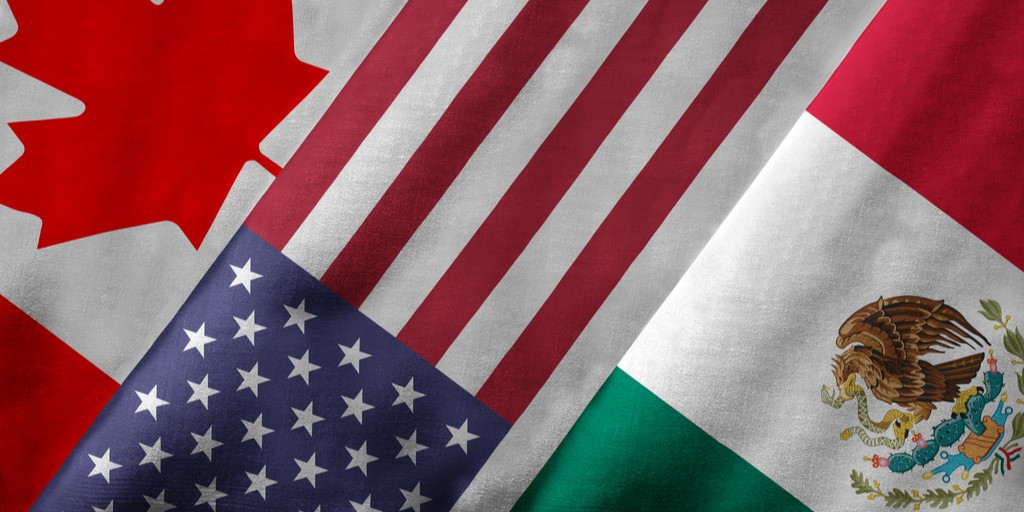The Unbearable Lightness of Free Trade
It is difficult to disagree with Veronique de Rugy’s extensive overview and assessment of the North American Free Trade Agreement. If there is a way to qualify her Liberty Forum essay, it is to go back to some fundamental questions about the benefits of free trade. These questions underlie de Rugy’s analysis and my response is more a matter of emphasis.
What we might call the unbearable lightness of free (international) trade comes not from serious objections against it; those don’t exist, even if some qualifications to it can be found. The unbearable lightness of free trade comes from the fact that it is, in the main public debates, defended for the wrong reasons. It is thus very fragile.
The fundamental reason why free trade is generally beneficial is that, at the international just like at the domestic level, it is simply an instance of economic freedom. Free trade is beneficial for the same reasons that, say, freedom to bid for the apartment of one’s choice or freedom of marriage are generally beneficial for individuals.
North American trade quite certainly became freer with NAFTA. The 600 pages or so (not including the side agreements on labor and the environment) of the 1994 treaty likely translated into a net reduction of trade regulation. It is more difficult to see the 2,082 pages of the United States-Mexico-Canada Agreement as representing a similar progress; the Wall Street Journal sees the USMCA as a “a giant step toward politically managed trade.” I would also argue that the Trans-Pacific Partnership from which President Trump withdrew was far from a clear improvement as it consecrated the inclusion of labor and environmental standards in the main text of trade agreements. Regulating trade is not the same thing as freeing it.
Remember that the TPP’s very title replaced the traditional wording, “free trade,” with “partnership.” The traditional wording is absent from the title of the USMCA, too; it’s just an “agreement.” Even more funny but in the same vein, the TPP’s successor, agreed on by the 11 national governments that were left high and dry by the U.S. government’s exit, was rechristened the “Comprehensive and Progressive Agreement for Trans-Pacific Partnership.” But then—and that’s my point—we should be weary of calling free trade something that isn’t.
The very idea that NAFTA needed to be modernized is suspicious. Is there a need to modernize the market of ideas? Is there a need to modernize the market for computers? Is that what the federal government tried to do during its dozen years of harassing IBM under antitrust laws? In truth, there is no need to modernize what is free. Freedom is auto-modernizing. Otherwise, modernizing is an easy excuse for regulating.
Not About Exports or Treaties
It is worth emphasizing what is, and what is not, free trade. The first thing to understand (and explain to those who don’t understand) is that free trade is not about exports. It is first and foremost about imports, exports being merely a means to pay for imports, if we can draw an analogy with the fact that an individual sells what he values less in order to purchase what he values more. Free trade is certainly not about maximizing exports and minimizing imports, notwithstanding what the 17th and 18th century mercantilists believed.
This idea was beautifully expressed by James Mill in his 1821 Elements of Political Economy. I can’t do better than to quote his clear prose:
The benefit which is derived from exchanging one commodity for another, arises, in all cases, from the commodity received, not from the commodity given. When one country exchanges, in other words, when one country traffics with another, the whole of its advantage consists in the commodities imported. It benefits by importation, and by nothing else. . . . That country, or, more properly speaking, the people of that country, have certain commodities of their own, but these they are willing to give for certain commodities of other countries. They prefer having those other commodities. They are benefited, therefore, not by what they give away; that it would be absurd to say; but by what they receive.
As its label indicates, free trade is about leaving individuals free to trade—hopefully all individuals in all countries, but crucially in our country. It is not what a foreign government allows its own subjects to do that makes our country a free country; it is what our own government allows us to do—or, more properly, doesn’t interfere with. Trump is asking American citizens to complain about the Chinese government forbidding its subjects to buy from American producers, but that’s bogus; Americans should complain when the American government prevents individuals and businesses here at home from importing Chinese goods. A free country is a country where individuals are free, not a country whose residents can look beyond their border and complain that, over there, individuals are not free (because, for example, they can’t import freely).
This way of looking at free trade is related to the economic argument for unilateral free trade. Speaking to a government, a free trader would say: “Let your own citizens (residents, to be technically correct) import what they are willing to pay for, and export what they can.” Economics shows that unilateral free trade is more beneficial than protectionism in virtually all cases. Every country should adopt it, especially since one cannot, in the long run, export more than one imports. Unilateral free trade does not require treaties, just like economic freedom does not require that people in other countries be free, too—although, of course, the more numerous are free people, the better.
Krugman’s Argument
All this is not very original. The idea of unilateral free trade has illuminated economics ever since Adam Smith published The Wealth of Nations in 1776. Economists of the 19th century improved on it. Today, it is shared by economists of different ideological leanings. In a remarkable 1997 article in the Journal of Economic Literature, Paul Krugman wrote:
The economist’s case for free trade is essentially a unilateral case: a country serves its own interests by pursuing free trade regardless of what other countries may do.
The Nobel prizewinner explains that, in order to advance free trade in the world, economists have felt obliged to defend it with invalid arguments revolving around the mercantilist’s obsession with exports. Economists have even tended to accept some harmonization of standards, like in the USMCA and, more mildly, in NAFTA’s side agreements on labor and the environment.
These compromises were deemed necessary to bring on board politicians subject to the influence of special producers’ interests. American (and Canadian) politicians might only accept some free trade with Mexico if labor standards limit competition from poor Mexican workers against rich, trade-unionized American workers. Economists thus abandon their “purist principle” and speak like the mercantilists they abhor in order to advance some degree of free trade.
Krugman proposed another, closely related, reason why economists accept supposedly “free trade” treaties when free trade does not require them—why, for example, they generally favor the World Trade Organization (and the preceding General Agreement on Tariffs and Trade). Multilateral or bilateral free trade treaties curb the capacity of one’s own government to yield to producers and exploit consumers through protectionist measures. The true purpose of such treaties, Krugman writes, is “not to protect us from unfair competition, but to protect us from ourselves”—for example, to make sure that American consumers of pizza are protected from Floridian tomato growers who request barriers against Mexican tomatoes.
What Krugman is saying—without exactly saying it and without wanting to say it in these terms—is that trade agreements are a means of constraining our own Leviathan. To repeat an old platitude, it’s your own government, stupid!
As if led by an invisible hand, we (by whom I mean economists who support individual liberty) have come to adopt the mercantilist terminology of our adversaries in order to defend free trade in public debates. We have been talking as if the goal were to maximize exports and jobs. We have adopted the language of “concessions,” which amounts to saying, “If you leave your subjects free to import widget A, I will concede to my own subjects the freedom to import widget B.” When a government makes a trade “concession” to a foreign government, it is in reality a freedom that it graciously concedes to its own subjects! We have been defending free trade with mercantilist arguments. NAFTA has been an instance of that; the USMCA, in which two-thirds of the chapters are plagiarized from the TPP, is an even worse case.
After decades (if not two centuries) of casually defending free trade for the wrong reasons, can we be surprised that it is viewed as indefensible by a large part of public opinion? After all, exports have not been maximized, as is suggested by the current-account deficit. NAFTA did not prove to be such a game-changer (for some good reasons that de Rugy explains, but also because it was based on the wrong justifications). Protectionist measures persist in the rest of the world and in America, too. Trade treaties need to be “modernized.” Sovereignty is threatened. America could be greater. And so forth. What’s so good about free trade?
Keep the True Justifications in Mind
Taking the purist’s side (and going further than Krugman), I believe that an economist or a free trader could have taken a stance either for or against the TPP, depending on whether he thought it would generate dynamic effects toward more or less free trade. In the same perspective, a free trader could cogently argue that the USMCA is worse than no NAFTA at all.
NAFTA was a good idea at the time. Like the WTO, it contributed to the development of supply chains that have created a large business constituency against protectionism. Think about Americans for Free Trade, an anti-protectionist coalition of more than 100 trade associations and other business organizations, from the National Retail Federation to the Motorcycle Industry Council and the Halloween Industry Association. Contrary to what happened so often in American history, these business interests are not asking for their own compensating tariffs to exploit the consumers even more; they are instead agitating against the new protectionism.
We have to live in the world as it is, and our reform drive must accord with this reality. As James Buchanan wrote in The Limits of Liberty (1975), “We start from here, from where we are, and not from some idealized world peopled by beings with a different history and with utopian institutions.” Yet I think my main point remains valid: If we must start politically where we are, our methodological and theoretical approach is grounded somewhere else. We need to insist on the fundamental justifications of free trade. It is part of economic freedom, which leaves each individual to choose what he wants, whatever the government or the mob might think. This is why free trade increases the opportunities of individuals.



